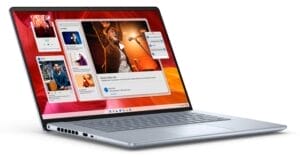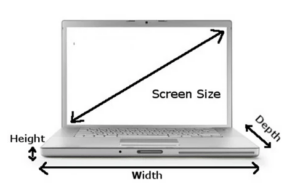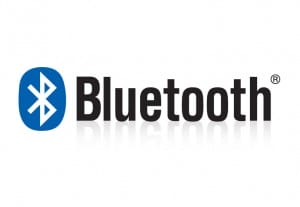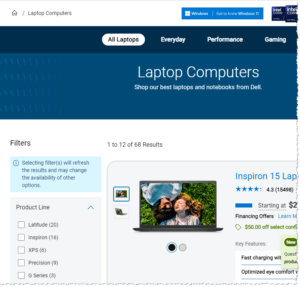New Home Laptop-Choices?

New Home Laptop-Choices? A reader asks…
I’m looking for a new home laptop. I’d like to avoid using a docking station, and want to connect my laptop to my home router with an ethernet cable. Looking at Dell laptops, there are so many choices! Can you help advise me?
Dell has designed different laptop lines for different types of needs. They have gaming laptops in their Alienware and G series lines, high-end computing laptops in their XPS line, solid business-class laptops in their Latitude and Precision lines, and their value line, the Inspiron laptops which I think provide the best value for the dollar, outside of the other lines’ specific use cases.

Since you mention connecting your laptop to an ethernet cable, you might think a dedicated ethernet port is important. Actually, not so. Most laptops these days come with modern USB-C ports that can be used with low-cost adapters to connect to most anything you need. For an Ethernet to USB-C adapter, Amazon has a nice one for $18 at https://www.amazon.com/Anker-Ethernet-PowerExpand-Aluminum-Portable/dp/B08CK9X9Z8/.
This sounds annoying, but really makes sense given that laptops are supposed to be light and portable, and the USB-C ports are very small.
For most home users, there are three main considerations for a laptop PC:

Screen size: a smaller screen is better for portability, but you sacrifice being able to see everything without scrolling as much. A larger screen means a bit heavier and larger laptop, but your screen display can show you more of a webpage or app than a small screen, without having to shrink everything on-screen to teensy-tiny images. For home use, many folks use a laptop in one place at home, not moving it around much (likely so in your case connected to an Ethernet cable). You may also take it places and use it elsewhere, but likely not in road-warrior mode (e.g., on an airplane).
While 14″ is common for the business-class line, 15″ is the usual sweet-spot, with Dell now having more 16″ models. I think the 16″ models are going to be best for most people.

Internal hard drive space: the more the better. Given that most people now have smartphones with cameras, we all want to keep all our photos & videos copied onto our computers, and that takes space. While many laptop models boast 512 gigabytes (gb) of storage space, I consider 1 terabyte (tb) to be the minimum for most people, and 2tb as a prudent option. This is cheap to include when you buy a laptop, and expensive or even impossible to expand later on.
Cost: Whether you are rich or not, you should consider the cost of a laptop as an important consideration. After all, these days after about five years of use, a laptop most often is nearing the end of its useful service life, and fixing old laptops is expensive. Most folks replace with a new laptop when their old laptop is starting to give them serious trouble. Not ecology-conscious, but a real-world experience.

For US consumers, I think you don’t want to spend more than about $2,000 on a laptop unless money is no object. After five years, the battery is starting to wear out, the fan and cooling system may have degraded and the laptop is going to be giving you more problems as technology (and our needs) marches forward. Spending under $1,000 on a laptop compromises on the quality of the internal components, which can shorten that useful life. But you need to stick within your own personal budget.
There are other minor considerations, like touch-screen and 2-in-1 capability, but they are more for specific needs. I didn’t mention RAM above because most laptops in this price range have either 16gb or 32gb of RAM (16gb is adequate, 32gb is more than enough). If you want to followup your question with your specific needs I can recommend more specific laptops for you, but in all cases what I recommend is a laptop with these minimum specifications:
- Recent generation Intel Core processor, either a 14th generation i7, or a 15th generation Core 7 or Core Ultra 7 processor.
- 15-16″ screen, touch or non-touch (your preference)
- 1-2tb internal storage drive (solid-state), or larger if you have lots of videos
- 16-32gb of RAM
- Windows 11 Pro versus Home – a minor cost difference and worth it just for the security (encrypted hard drive (for Windows 11, BitLocker)
Optional items:

- If you prefer a mouse over the built-in touchpad, buy a Bluetooth mouse as your laptop will have Bluetooth built-in and you don’t need a port for a USB button.
- Optionally, you could consider dedicated graphics (NVIDIA or AMD) with dedicated graphics memory – good for driving multiple external monitors, for joining large Zoom video conferences or doing some casual video editing.
- If you have a home office and are setting up the laptop to work there mostly, with trips to vacation homes, hotels, etc., then consider a nice laptop travel bag or backpack and a second power adapter just for travel.

Last thing to consider is that Dell and all the other brands are constantly releasing new models, so any specific laptop model recommendations are very short-lived. Your best bet is to go to the online configurator at https://www.dell.com/en-us/shop/scc/scr/laptops and use the left-side to narrow down your needs: product line, screen size, processor, graphics capability, etc. If you see terms you don’t recognize, do a google search on the term to find out more about it. And the online configurators may not have all available options, so once you’ve narrowed down your choice, give their sales team a call to order and ask if they can meet your needs (usually a larger internal hard drive). Dell’s sales team is at 877-275-3355.
It’s always good to do some research before making a purchase, and my personal opinion is that Dell and Lenovo offer the best value and reliability in Windows laptop computers – at this point in time. Their quality and reliability is quite good across their entire lines, and their support services are good. You need to think about exactly what types of use you plan for your laptop so that you get the features that are going to fit best with those needs. Feel free to add a comment below with more of your specific needs and I can add more specific advice.
And once you’ve got your new laptop, you want to set it up optimally for your own personal or family use. I have advice in other articles about power settings, using Microsoft 365’s OneDrive for backup and security, and more.
This website runs on a patronage model. If you find my answers of value, please consider supporting me by sending any dollar amount via:
or by mailing a check/cash to PosiTek.net LLC 1934 Old Gallows Road, Suite 350, Tysons Corner VA 22182. I am not a non-profit, but your support helps me to continue delivering advice and consumer technology support to the public. Thanks!






